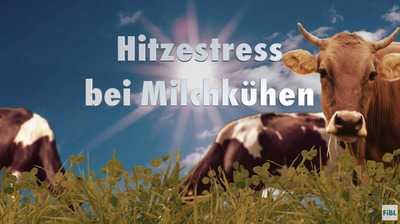{Tool} Recognising and avoiding heat stress in pastured dairy cows. [Erkennen und Vermeiden von Hitzestress bei Milchkühen auf der Weide.] Creator(s): Alföldi, Thomas and Holinger, Mirjam. Issuing Organisation(s): FiBL - Research Institute of Organic Agriculture. (2023)
![[thumbnail of 2024-11-04 14_24_38-(14) Recognising and avoiding heat stress in pastured dairy cows - YouTube – Moz.png]](/54292/1.hassmallThumbnailVersion/2024-11-04%2014_24_38-%2814%29%20Recognising%20and%20avoiding%20heat%20stress%20in%20pastured%20dairy%20cows%20-%20YouTube%20%E2%80%93%20Moz.png)  Preview |
Image (PNG)
- Cover Image
- German/Deutsch
1MB |
|
Video (MP4)
- Published Version
- German/Deutsch
155B |
Document available online at: https://www.youtube.com/watch?v=ZqlpvGDKScI
Summary in the original language of the document
In this video, researcher Mirjam Holinger and organic farmer Silvia Stohler talk about important measures for avoiding heat stress in organic dairy cows and Silvia Stohler mentions specific measures she uses on her farm.
Summary translation
In diesem Video sprechen die Forscherin Mirjam Holinger und die Biobäuerin Silvia Stohler über wichtige Maßnahmen zur Vermeidung von Hitzestress bei Bio-Milchkühen und Silvia Stohler nennt konkrete Maßnahmen, die sie auf ihrem Betrieb anwendet.
| EPrint Type: | Practice tool |
|---|---|
| Teaser: | Practical recommendations for avoiding heat stress in grazing cattle. |
| What problem does the tool address?: | The topic of heat stress is well researched worldwide. However, there are hardly any studies that relate to conditions in Switzerland. In particular, little is known about how dairy cows on pasture react to heat stress. A survey has shown that farmers often overestimate the threshold for heat stress. Heat stress can already occur at around 16 degrees Celsius, depending on humidity, wind and solar radiation. Cows under heat stress eat less to avoid additional heat from digestion. The effects of heat stress on milk yield become apparent with a delay of about three days. In the medium term, heat stress can also affect the fertility of cows. During heat stress, cows increase their breathing rate to release body heat. If they can no longer do this, their body temperature rises. An increased body temperature of over 38.5 degrees indicates heat stress. In behaviour, cows show heat stress in so-called grouping behaviour, among other things. Fleeing animals generally show this behaviour in stressful situations. They stand close to each other, do not eat and do not chew again. |
| What solution does the tool offer?: | Measures against heat stress in grazing cows include bringing them back into the barn, providing drinking troughs and shade, grazing in the cooler hours, timely observation and use of warning apps as well as insect protection. Fans, misting and showers can be used when housing cows indoors. When converting or building new stables, the heat factor should also be taken into account. Recognising the right moment when one's own herd begins to suffer from heat stress requires good observation and experience. |
| Country: | Switzerland |
| Type of Practice Tool: | Video |
| Agrovoc keywords: | Language Value URI English dairy cattle http://aims.fao.org/aos/agrovoc/c_2108 English grazing http://aims.fao.org/aos/agrovoc/c_25243 English animal health http://aims.fao.org/aos/agrovoc/c_431 English animal welfare http://aims.fao.org/aos/agrovoc/c_443 English animal housing http://aims.fao.org/aos/agrovoc/c_432 English climate change http://aims.fao.org/aos/agrovoc/c_1666 English climate change adaptation http://aims.fao.org/aos/agrovoc/c_1374567058134 English heat tolerance http://aims.fao.org/aos/agrovoc/c_11486 English resilience http://aims.fao.org/aos/agrovoc/c_1374480530924 |
| Subjects: | Animal husbandry > Production systems > Dairy cattle Animal husbandry > Health and welfare Environmental aspects |
| Research affiliation: | Switzerland > FiBL - Research Institute of Organic Agriculture Switzerland > Animal > Cattle European Union > Horizon Europe > OrganicClimateNET > selected tools European Union > Organic Farm Knowledge |
| Horizon Europe or H2020 Grant Agreement Number: | 101136880 |
| Related Links: | https://organic-farmknowledge.org/tool/54292, https://organic-farmknowledge.org/tool/53645, https://organic-farmknowledge.org/tool/54290, https://organic-farmknowledge.org/tool/43977, https://organic-farmknowledge.org/tool/43978, https://organic-farmknowledge.org/tool/43823 |
| Project ID: | OFK |
| Deposited By: | Rüger, Madelaine Lea |
| ID Code: | 54292 |
| Deposited On: | 05 Nov 2024 07:47 |
| Last Modified: | 13 Mar 2025 09:10 |
| Document Language: | English, German/Deutsch, French/Francais, Italian/Italiano |
| Status: | Published |
Repository Staff Only: item control page

 Download Statistics
Download Statistics Download Statistics
Download Statistics
